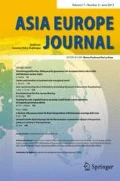Abstract
Normative Power Europe is not just an academic concept: it is part of the self-understanding of many EU policymakers. They believe that the EU is setting standards of state behaviour in Europe and globally. The EU is regarded as an elaborator and epitomizer of European and ‘civilised’ values, as a model for other regions and states and as inherently an ethical actor. Russian policymakers reject these notions and, in doing so, increasingly accuse the EU of ‘double standards’, arguing that EU external action is inconsistent and does not always match its rhetoric; that the rhetoric therefore masks the pursuit of interests in its foreign policy; that the EU is like any other state (or state-like entity) and has no special claim to act ethically or to be a moral authority; and that internally, the EU does not live up to the values it seeks to impose on others. This article gives examples of Russian talk of EU double standards, analyses the motivations and assesses the likely impact. It argues that for such criticism to have any impact on EU policy, the critic must be seen as a moral equal, which the EU’s sense of moral superiority over Russia rules out.
Similar content being viewed by others
Notes
http://rt.com/shows/crosstalk/cold-war-west-russia-667/. Spotting Western ‘double standards’ has almost become a national pastime. Participants can contribute their successful sightings to the webpage http://pikabu.ru/tag/двойные стандарты/new. For a compilation of articles relating to the USA, see http://www.km.ru/category/tegi/dvoinye-standarty-i-izderzhki-demokratii-ssha
Like Diez (2013), I would also argue that interests and values are not necessarily contradictory, although they may not be as fully intertwined as he suggests, particularly in the case of certain ethical norms (there may be issues—for example, climate change—where espoused values conflict with at least short-term interests or require sacrifices in other areas).
References
Barroso JMD (2007) John Peterson interviews the European Commission President 17 July 2007. http://www.eu-consent.net/library/BARROSO-transcript.pdf Accessed 24 April 2014
Barroso JMD (2012) Speech by President Barroso at Princeton University: ‘European Union: an indispensible partner’. http://europa.eu/rapid/press-release_SPEECH-12-650_en.htm?locale=FR. Accessed 24 April 2014
Brown C (2010) Practical judgement, International political theory: selected essays. Routledge, London/New York
Buckley N (2012) The return of whataboutism. Financial Times. http://blogs.ft.com/the-world/2012/06/the-return-of-whataboutism/?infernofullcomment=1&SID=google. Accessed 28 April 2014
Casier T (2013) The EU–Russia strategic partnership: challenging the normative argument. Eur Asia Stud 65(7):1377–1395
DeBardeleben J (2012) Applying constructivism to understanding EU-Russian relations. Int Polit 49(4):418–433
Diez T (2005) Constructing the self and changing others: reconsidering ‘normative power Europe’. Millennium J Int Stud 33(3):613–636
Diez T (2013) Normative power as hegemony. Cooperation Confl 48(2):194–210
Euronews (2012) Putin slams EU criticism of Russia’s rights record http://www.youtube.com/watch?v=eXh2Y_O4gl8. Accessed 12 March 2013
Farrell H, Finnemore M (2013) The end of hypocrisy: American foreign policy in the age of leaks. Foreign Aff 92(6):22–26
Gaskarth J (2011) Where would we be without rules? A virtue ethics approach to foreign policy analysis. Rev Int Stud 37(1):393–415
Gaskarth J (2012) The virtues in international society. Eur J Int Relat 18(3):431–453
Hanson SE (2005) On double standards: toward strategic liberalism in U.S. Russia policy. PONARS Policy Memo No. 368. http://www.ponarseurasia.org/memo/double-standards-toward-strategic-liberalism-us-russia-policy. Accessed 18 February 2014
Harding L (2008a) Kosovo breakaway illegal, says Putin. The Guardian. http://www.theguardian.com/world/2008/feb/15/russia.kosovo. Accessed 5 February 2014
Harding L (2008b) Georgia: Moscow accuses west of double standards. The Guardian. http://www.theguardian.com/world/2008/aug/30/russia.georgia. Accessed 5 February 2014
Headley J (2008) Russia and the Balkans: foreign policy from Yeltsin to Putin. Hurst and Co./Columbia University Press, London/New York
Headley J (2012) Is Russia out of step with European norms? Assessing Russia’s relationship to European identity, values and norms though the issue of self-determination. Eur Asia Stud 64(3):427–447
Headley J (2014) Russia’s complex engagement with European Union norms: sovereign democracy versus post-Westphalianism? In: Björkdahl A, Chaban N, Leslie J, Masselot A (eds) Importing EU norms? Conceptual framework and empirical findings. Springer
Lavrov S (2014a) V otnoshenii Ukrainy Evrosoiuz primeniaet dvoinye standarty – Lavrov. Gazeta.ua. http://gazeta.ua/ru/articles/politics/_v-otnoshenii-ukrainy-evrosoyuz-primenyaet-dvojnye-standarty-lavrov/537524. Accessed 25 February 2014
Lavrov S (2014b) West, Kiev apply double standards to protesters in E. Ukraine – Lavrov. RT. http://rt.com/news/lavrov-ukraine-crisis-interview-108/. Accessed 26 April 2014
Manners I (2002) Normative Power Europe: a contradiction in terms? J Common Mark Stud 40(2):235–258
Manners I (2008) The normative ethics of the European Union. Int Aff 84(1):45–60
March JG, Olsen JP (1998) The institutional dynamics of international political orders. Int Organ 52(4):943–969
Neumann IB (1995) Russia and the idea of Europe: a study in identity and international relations. Routledge, London/New York
Novosti R (2013) Russia ready to ‘eradicate’ double standards at UN rights body. http://en.ria.ru/world/20131129/185134808/Russia-Ready--to-Eradicate-Double-Standards-at-UN-Rights-Body.html. Accessed 12 January 2014
Prichard A (2013) Justice and EU foreign policy. J Contemp Eur Stud 21(3):413–429
Pushkov A (2014) Russia’s European policy. Valdai discussion club. http://valdaiclub.com/europe/66780.html. Accessed 21 February 2014
Risse T (2000) ‘Let’s argue!’ Communicative action in world politics. Int Organ 54(1):1–39
RT (2014) Russia blasts PACE’s ‘double standard’ resolution on Ukraine. http://rt.com/news/russia-pace-ukraine-resolution-423/. Accessed 18 February 2014
Schimmelfennig F (2001) The community trap: liberal norms, rhetorical action, and the eastern enlargement of the European Union. Int Organ 55(1):47–80
The Economist (2008) Whataboutism. Come again, Comrade? http://www.economist.com/node/10598774. Accessed 28 April 2014
van Rompuy H (2014) Remarks by president of the European Council Herman Van Rompuy following the extraordinary meeting of EU heads of state or government on Ukraine. EUCO. 55/14.http://www.consilium.europa.eu/uedocs/cms_data/docs/pressdata/en/ec/141373.pdf. Accessed 7 March 2014
von Eggert K (2012) Due west: ‘Whataboutism’ is back—and thriving. Ria Novosti. http://en.ria.ru/columnists/20120725/174777687.html. Accessed 28 April 2014
Author information
Authors and Affiliations
Corresponding author
Rights and permissions
About this article
Cite this article
Headley, J. Challenging the EU’s claim to moral authority: Russian talk of ‘double standards’. Asia Eur J 13, 297–307 (2015). https://doi.org/10.1007/s10308-015-0417-y
Published:
Issue Date:
DOI: https://doi.org/10.1007/s10308-015-0417-y



